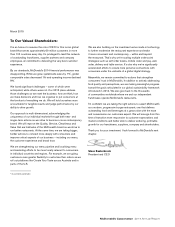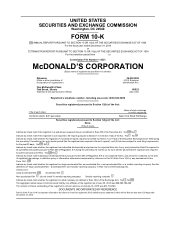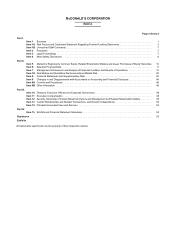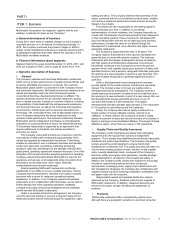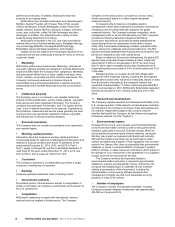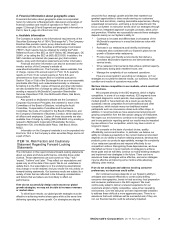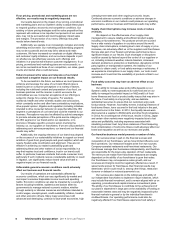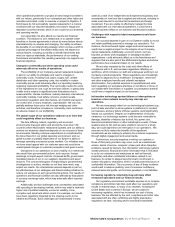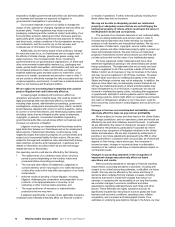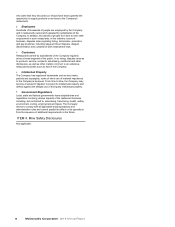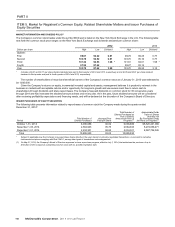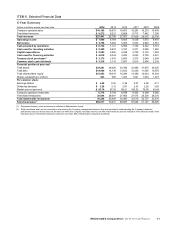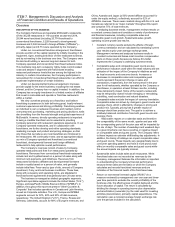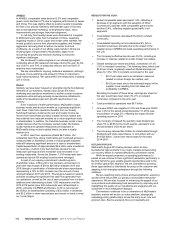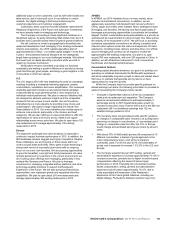McDonalds 2014 Annual Report Download - page 12
Download and view the complete annual report
Please find page 12 of the 2014 McDonalds annual report below. You can navigate through the pages in the report by either clicking on the pages listed below, or by using the keyword search tool below to find specific information within the annual report.
6 McDonald’s Corporation 2014 Annual Report
imposed by multiple governmental authorities can adversely affect
our business and increase our exposure to litigation or
governmental investigations or proceedings.
Our success depends in part on our ability to manage the
impact of new, potential or changing regulations that can affect our
business plans. These regulations may relate to product
packaging, marketing and the nutritional content and safety of our
food and other products, labeling and other disclosure practices
(particularly given varying requirements and practices for testing
and disclosure), ordinary variations in food preparation among our
own restaurants, and the need to rely on the accuracy and
completeness of information from third-party suppliers.
Additionally, we are keenly aware of and working to manage
the risks and costs to us, our franchisees and our supply chain of
the effects of climate change, greenhouse gases, energy and
water resources. The increased public focus, including by
governmental and non-governmental organizations, on these and
other environmental sustainability matters (e.g., packaging and
waste, animal health and welfare, deforestation and land use) and
the increased pressure to make commitments, set targets or
establish additional goals and take actions to meet them, could
expose us to market, operational and execution costs or risks. If
we are unable to effectively manage the risks associated with our
complex regulatory environment, it could have a material adverse
effect on our business and financial condition.
We are subject to increasing legal complexity and could be
party to litigation that could adversely affect us.
Increasing legal complexity will continue to affect our
operations and results in material ways. We could be subject to
legal proceedings that may adversely affect our business,
including class actions, administrative proceedings, government
investigations, employment and personal injury claims, landlord/
tenant disputes, disputes with current or former suppliers, claims
by current or former franchisees, and intellectual property claims
(including claims that we infringed another party’s trademarks,
copyrights, or patents). Inconsistent standards imposed by
governmental authorities can adversely affect our business and
increase our exposure to litigation.
Litigation involving our relationship with franchisees and the
legal distinction between our franchisees and us for employment
law purposes, if determined adversely, could increase costs,
negatively impact the business prospects of our franchisees and
subject us to incremental liability for their actions. We are also
subject to the legal and compliance risks associated with privacy,
data collection, protection and management, in particular as it
relates to information we collect when we provide technology-
related services to franchisees.
Our operating results could also be affected by the following:
The relative level of our defense costs, which vary from
period to period depending on the number, nature and
procedural status of pending proceedings;
The cost and other effects of settlements, judgments or
consent decrees, which may require us to make disclosures
or take other actions that may affect perceptions of our brand
and products;
Adverse results of pending or future litigation, including
litigation challenging the composition and preparation of our
products, or the appropriateness or accuracy of our
marketing or other communication practices; and
The scope and terms of insurance or indemnification
protections that we may have.
A judgment significantly in excess of any applicable insurance
coverage could materially adversely affect our financial condition
or results of operations. Further, adverse publicity resulting from
these claims may hurt our business.
We may not be able to adequately protect our intellectual
property or adequately ensure that we are not infringing the
intellectual property of others, which could harm the value of
the McDonald’s brand and our business.
The success of our business depends on our continued ability
to use our existing trademarks and service marks in order to
increase brand awareness and further develop our branded
products in both domestic and international markets. We rely on a
combination of trademarks, copyrights, service marks, trade
secrets, patents and other intellectual property rights to protect our
brand and branded products. We also license our intellectual
property to franchisees and we cannot assure you that they will
not take actions that hurt the value of our intellectual property.
We have registered certain trademarks and have other
trademark registrations pending in the United States and certain
foreign jurisdictions. The trademarks that we currently use have
not been registered in all of the countries outside of the United
States in which we do business or may do business in the future
and may never be registered in all of these countries. The steps
we have taken to protect our intellectual property in the United
States and foreign countries may not be adequate. In addition, the
steps we have taken may not adequately ensure that we do not
infringe the intellectual property of others and third parties may
claim infringement by us in the future. In particular, we may be
involved in intellectual property claims, including often aggressive
or opportunistic attempts to enforce patents used in information
technology systems, which might affect our operations and results.
Any claim of infringement, whether or not it has merit, could be
time-consuming, could result in costly litigation and could harm our
business.
Changes in tax laws and unanticipated tax liabilities could
adversely affect the taxes we pay and our profitability.
We are subject to income and other taxes in the United States
and foreign jurisdictions, and our operations, plans and results are
affected by tax and other initiatives around the world. In particular,
we are affected by the impact of changes to tax laws or related
authoritative interpretations, particularly if corporate tax reform
becomes a key component of budgetary initiatives in the United
States and elsewhere. We are also impacted by settlements of
pending or any future adjustments proposed by the IRS or other
taxing authorities in connection with our tax audits, all of which will
depend on their timing, nature and scope. Any increases in
income tax rates, changes in income tax laws or unfavorable
resolution of tax matters could have a material adverse impact on
our financial results.
Changes in accounting standards or the recognition of
impairment charges may adversely affect our future
operations and results.
New accounting standards or changes in financial reporting
requirements, accounting principles or practices, including with
respect to our critical accounting estimates, could affect our future
results. We may also be affected by the nature and timing of
decisions about underperforming markets or assets, including
decisions that result in impairment charges that reduce our
earnings. In assessing the recoverability of our long-lived assets,
we consider changes in economic conditions and make
assumptions regarding estimated future cash flows and other
factors. These estimates are highly subjective and can be
significantly impacted by many factors such as global and local
business and economic conditions, operating costs, inflation,
competition, and consumer and demographic trends. If our
estimates or underlying assumptions change in the future, we may



